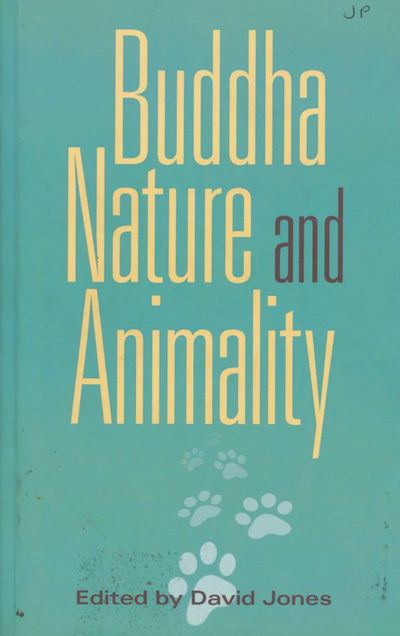- Acknowledgementsv
- Contributorsix
- Introduction: Toward an Ecology of Compassion—Homo Specialis, Animality, and
Buddha-Nature- David Jones1
- Buddha Animals
- Jason M. Wirth13
- Jataka, Pancatantra, and the Rhetoric of Animalia in South Asia
- Thomas A. Forsthoefel23
- Buddha-nature and Bodhicitta: Animals and Humans in Dramatic Ensembles Intent
upon Enlightenment- Peter D. Hershock41
- Animal Forms and Formlessness: The Protean Quality of Buddha Nature in Chinese
Martial Arts- Harriette Grissom59
- Does a Dog See Into its Buddha-Nature? Re-posing the Question of Animality/Humanity
in Zen Buddhism- Bret W. Davis83
- Asking the Question: Do Animals Have Buddha-Nature
- Thomas Pynn127
- Zen Eye Hunter, Zen Eye Hunted: Revealing the Animal Face of Buddha-Nature
- Brian Schroeder149
- One Cell, Symbiosis, and the Buddha's Broken Karmic Wheel: A Legacy of an Ancient Bacterium
- Keiko Takioto Miller165
- Animality and Desire in the Buddhist Monastic Code
- Jennifer L. Manlowe185
- Animal Buddhas
- David Jones195
- Index205
No edit summary |
No edit summary |
||
| (6 intermediate revisions by the same user not shown) | |||
| Line 7: | Line 7: | ||
|BookToc=*{{i|Acknowledgements|v}} | |BookToc=*{{i|Acknowledgements|v}} | ||
*{{i|Contributors|ix}} | *{{i|Contributors|ix}} | ||
*Introduction: ''Toward an Ecology | *Introduction: ''Toward an Ecology of Compassion—Homo Specialis, Animality, and<br>Buddha-Nature'' | ||
Animality, and Buddha-Nature'' | **{{i|David Jones|1}} | ||
*{{i|David Jones|1}} | *''Buddha Animals'' | ||
Buddha Animals | **{{i|Jason M. Wirth|13}} | ||
Jason M. Wirth 13 | *''Jataka, Pancatantra, and the Rhetoric of Animalia in South Asia'' | ||
Jataka, Pancatantra, and the Rhetoric | **{{i|Thomas A. Forsthoefel|23}} | ||
Thomas A. Forsthoefel 23 | *''Buddha-nature and Bodhicitta: Animals and Humans in Dramatic Ensembles Intent<br>upon Enlightenment'' | ||
Buddha-nature and Bodhicitta: Animals and Humans in | **{{i|Peter D. Hershock|41}} | ||
Dramatic Ensembles Intent upon Enlightenment | *''Animal Forms and Formlessness: The Protean Quality of Buddha Nature in Chinese<br>Martial Arts'' | ||
Peter D. Hershock 41 | **{{i|Harriette Grissom|59}} | ||
Animal Forms and Formlessness: The Protean Quality | *''Does a Dog See Into its Buddha-Nature? Re-posing the Question of Animality/Humanity<br>in Zen Buddhism'' | ||
Nature in Chinese | **{{i|Bret W. Davis|83}} | ||
Harriette Grissom 59 | *''Asking the Question: Do Animals Have Buddha-Nature'' | ||
Does a Dog See Into its Buddha-Nature? Re-posing the Question | **{{i|Thomas Pynn|127}} | ||
*''Zen Eye Hunter, Zen Eye Hunted: Revealing the Animal Face of Buddha-Nature'' | |||
Bret W. Davis 83 | **{{i|Brian Schroeder|149}} | ||
Asking the Question: Do Animals Have Buddha-Nature | *''One Cell, Symbiosis, and the Buddha's Broken Karmic Wheel: A Legacy of an Ancient Bacterium'' | ||
Thomas Pynn 127 | **{{i|Keiko Takioto Miller|165}} | ||
Zen Eye Hunter, Zen Eye Hunted: Revealing the Animal Face | *''Animality and Desire in the Buddhist Monastic Code'' | ||
**{{i|Jennifer L. Manlowe|185}} | |||
Brian Schroeder 149 | *''Animal Buddhas'' | ||
One Cell, Symbiosis, and the Buddha's Broken Karmic Wheel: | **{{i|David Jones|195}} | ||
A Legacy | *{{i|Index|205}} | ||
Keiko Takioto Miller 165 | |PublisherLogo=File:Jain Publishing logo.png | ||
Animality and Desire in the Buddhist Monastic Code | |StopPersonRedirects=No | ||
Jennifer L. Manlowe 185 | |||
Animal Buddhas | |||
David Jones 195 | |||
Index 205 | |||
|AddRelatedTab=No | |AddRelatedTab=No | ||
}} | }} | ||
Latest revision as of 17:05, 26 May 2023
Buddha Nature and Animality is about peaceful living. In discussions about the relation between humans and their animal relatives, a central theme is that Buddhism represents the most viable philosophical/religious alternative to the malaise surrounding us when we confront ecological problems. This recognition points to the notion of compassion. Karuna is given expression as an alternative to stewardship since stewardship too falls into the dualistic trap of privileging the human. Authors seek beyond the limits imposed by discourses of ethics and assume a more radical approach to seek the roots of the perspectives that allow the conceptual space for the problematic dialogues in the first place. Rather than viewing animals as distinct beings sharing our environs, authors attempt to give the animal soul back to spirituality. They argue for the naturally enlightened spontaneity arising in animal nature and that animal nature is Buddha-nature. This "animal-buddha" nature is fundamental to understanding Buddhism as a 21st century philosophy for living and dying. (Source: Jain Publishing Company)
| Citation | Jones, David., ed. Buddha Nature and Animality. Fremont, CA: Jain Publishing Company, 2007. |
|---|---|


